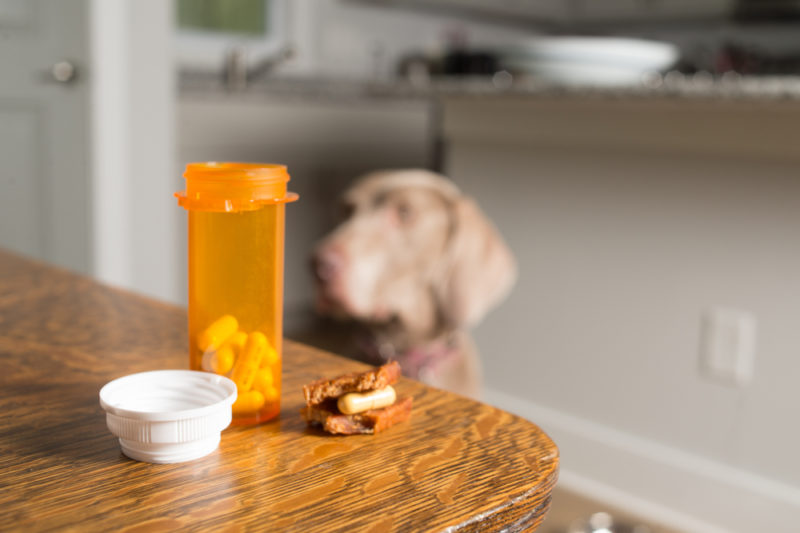Do you feel like your pets are always getting things? If so, it is time to consider how you are storing prescription medications in your home. We all know that dogs and cats are curious, and they are no match for “child-proof” caps on medications, which makes it too easy for them to accidentally ingest something that could potentially harm them. While many pet owners know the dangers of certain foods and chemicals, prescription medications are often overlooked. The dangers of prescription medications to pets vary depending on the type of medication and the amount ingested.
Seemingly harmless items, like inhalers, bottles of pills, and liquid medication measuring tools can cause all kinds of problems if our pets get into them. For example, if you are pouring liquid medication into a measuring cup and walk away, your pet can quickly find it and lap up all of the medication, which can lead to all kinds of symptoms. Inhalers can be bitten into, which allows your pet to inhale the medication inside, which can cause high blood pressure and increased heart rate. If your dog or cat gets into a bottle of pills, they can overdose or become very ill due to the ingredients in the medication.

While all medications can have serious side effects, some are more harmful to our pets than others. Additionally, some medications are more commonly ingested by our pets. Here is a list of a few of the most commonly ingested human medications that pets ingest:
NSAIDs, such as Advil, Motrin, and Aleve, are some of the most ingested medications by pets, because they are very common in most households. Even though humans don’t think much about the safety of these medications, even a pill or two can be very harmful to your pet. Dogs and cats can develop stomach and intestinal ulcers from NSAIDs. Kidney failure has even been linked to NSAIDs.
Another popular pain reliever is acetaminophen. This medication is very dangerous to pets, especially cats. Just a single regular-strength tablet can damage a cat’s red blood cells, which limits the ability of those cells to carry oxygen. Acetaminophen can lead to red blood cell damage and liver failure in dogs.
Occasionally, antidepressants are used to treat pets, but overdoses can cause very serious neurological problems. These problems can lead to tremors, seizures, incoordination, and more. Some antidepressants stimulate the body and can cause the heart rate to elevate to dangerous levels, as well as blood pressure and body temperature. Unfortunately, pets often seem to enjoy the taste of some of these medications, such as Effexor, which means they may consume more than enough for the pills to be dangerous and deadly.
Medications like Adderall and Ritalin are common ADD and ADHD treatments. These medications contain strong stimulants that can cause tremors, seizures, elevated body temperatures, and heart problems in pets. These medications can be deadly to dogs and cats.
While these kinds of medications are supposed to support relaxation in people, they often have the opposite effect in pets.About half of the time, when dogs ingest sleep aids, they become agitated instead of tired. Additionally, pets can experience incoordination, lethargy, and slowed breathing.
Birth control pills generally come in packages that are very easy for pets to get into. A small amount of these pills will likely not cause any problems for dogs and cats, but large ingestions can cause problems in non-spayed pets.
ACE inhibitors are used to treat high blood pressure in people and pets occasionally. Overdoses of ACE inhibitors can cause weakness, dizziness, and low blood pressure. While small doses of these medications generally don’t cause any problems, a large dose could cause problems. For pets with kidney failure or heart disease, these medications can be very dangerous.
Another type of high blood pressure medication can also cause problems for pets. Beta-blockers can cause serious poisoning in pets, and overdoses can easily be life-threatening, as blood pressure can decrease to a dangerous level and heart rate can become very slow.
Pets can have thyroid conditions that are very similar to humans. Surprisingly, dogs often require higher doses of thyroid hormones to treat the conditions than humans. So, if your dog happens to get into thyroid hormones, it is usually not going to cause a lot of problems. However, if dogs and cats ingest a large amount of the medication, it can cause panting, rapid heart rate, aggression, and muscle tremors.
If pets get into cholesterol-lowering medications, like Lipitor or Crestor, they may cause vomiting and diarrhea. One-time ingestions are generally no cause for concern, but long-term use could cause serious side effects.
If your pet does get into a medication, you can contact the Pet Poison Helpline at 855-764-7661. You may need to seek immediate medical assistance. An emergency veterinarian can help you come up with an appropriate treatment plan for your pet.